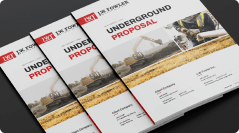Managing Cashflow
Written by Randy Blount
January 16, 2022
Anyone who’s ever run out of money before the end of the month, or the end of a job, knows how important cash flow is. A successful business is not only built on the right balance of profits and losses. In many cases, what’s more important is the timing of the cash that comes into and flows out of your business.
Your cash position affects every business decision you make. When cash is tight, you may worry about making payroll. When cash is flowing, it’s easy to forget upcoming liabilities like taxes. We’ve all seen dirt world companies that run with only a few dollars in the bank at any time. However, that strategy can leave you vulnerable when something unexpected happens.
How your access to cash drives your decision-making.
As Blount noted, “I think a lot of contractors have a line of credit, right? So they're actually negative, they're running off of borrowed money, because growing is hard.” And the reality is that most people don’t pay you right away.
Add to that the fact that many contractors operate at a profit margin that is at or below 10%. “If you're bidding a job at a 10% profit, there's a good chance that your cash position is not changing a whole lot. You're pretty tight,” said Blount.
How can you better manage this situation? If you haven’t owned the business very long, Blount advised owners, “Don’t plan on taking cash out. It’s not a good idea. Keep the money in there.”
It’s also important to know what your business costs to run for, say, three months, according to Blount’s rule of thumb. While it’s unlikely that you will go without being paid for three months, Blount Contracting decided to save until they had three months’ reserve in their company and Blount found that doing so “changed our business.” For Blount Contracting, this meant getting to where they always had about $2 million in cash in the business. This allowed them to be sure of their position and it allowed them to grow.
As Blount noted, when you’re growing and you’re cash poor, you begin to make bad decisions. If you need to get paid this week, you may take a 2% discount. If you consistently do this in a low-margin business, “All you're doing is continuing to erode your profits, every time you have to do it,” said Blount.
Or you may take a particular job because you need to make some quick money. So you bid low. And then you don’t make money on it, which can lead to not paying your vendors on time. If you’re unable to pay on time, that news spreads fast and can cause subs and suppliers not to work with you.
Seeing the financial management side of the business.
Not all contractors and construction firm owners invest in accounting to the degree they could or should. It’s more fun to spend money on equipment and things you can see. But, if you don’t see — and invest in — the financial management side of the business, you won’t have the right systems when you need them.
“That system that manages the money is the same system that helps you understand your costs — the same system that helps you be profitable,” said Blount. He looks at a company like a football team: “There's a lot of jobs that aren't glamorous, but we don't win without them. Like sometimes I'd say accounting is the left tackle. He's guarding your blind side. And they're worth their weight in gold. Because if they don't do it well, you may not be profitable, and you may not even know it.”
Also, the strength of your financial management systems can affect the bonding you’re able to acquire. “So, one, [having a] strong position allows growth,” said Blount. “Growth with good systems equals more revenue — more profit.”
It’s also good for your people. Blount sees it almost as a recruiting tool: “Being able to look someone in the eye and say, we're financially sound, we will be here in 10 years, and we want you to be a part of our team. It means something. And I think it means something to your clients, too.”
Takeaways.
Managing your cash is not that different from managing any other aspect of your dirt world business: “Do what you say you're going to do. Get the money and pay it to the people that are owed it,” said Blount. With a three-month reserve, you can keep yourself out of the position of not being able to make payroll or other expenses.
You may feel you can grow your business aggressively through a line of credit. Which you can, but be careful about it, to help ensure you’re not sustaining a negative cash flow position.
In a low-margin industry, it’s imperative to understand the cash flow for the particular project. Are you billing enough? Are you being paid on time? If not, as the owner, said Blount, “You're never above collecting. There's plenty of times where I've had to pick up the phone. And it's humbling.”
Attend to the financial management side of your business as professionally as you do your job site and you’ll reap the benefits for years to come.














